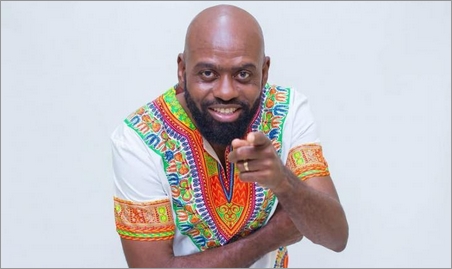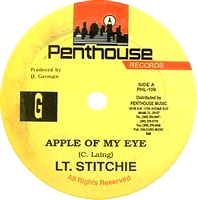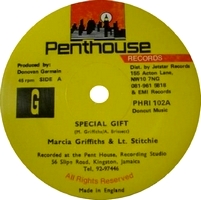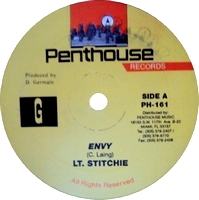Interview with ... Lieutenant Stitchie
Lieutenant Stitchie was a top artist in the dancehall industry during the 80s and the 90s before he switched to gospel reggae.
His impressive discography and its numerous hits give evidence of him.
Since he converted to Christianity in the late 90s, he became the first major exponent of gospel reggae, collecting numerous awards. March 2016 - penthouserecords.free.fr Thanks to Kunta (Zion High Foundation) for his precious collaboration |
|
Who found your nickname “The Governor” ?
As the number 1 deejay on Stereo One sound system, I had many clashes with other sound systems and their dj's and I defeated them all. I've never lost in a lyrical showdown since the infancy of my career to this day and my lyrical prowess and supremacy has never been in question from then, even until current. I've changed the face of dancehall music from being just about rhyming to writing stories using colorful adjectives, figures of speech; like similes, metaphor, personification and so on. I introduced lyrical styles by spelling while delivering a powerful message in a song, stuttering deliberately while flowing on a rhythm flawlessly, speed rapping lyrics on a rhythm at tremendous pace without losing the tempo and simultaneously, delivering the lyrics with clarity and not a babel. I introduced lessons; like biology, english language, west indian history and so, from high school curriculum to dancehall fans globally. I introduced new words and meanings from the Oxford dictionary which took the dancehall vocabulary to a new level, which is patterned by so many of the new dancehall artists today. I'm the first dancehall artist who is a professionally trained teacher of physical education and biology, plus there are so many other positive contributions that I've added, like so many other great dancehall icons before and after my exposure on the scene, to the colorful painting of this magnificent piece of art on the canvas of dancehall music. So from then the dancehall fans gave me the title "The Governor" as the man who governors the entire dancehall globally. Also being the first dancehall artist to sign to a major label, Atlantic Records in 1988, my first album was entitled " The Governor " from which the first dancehall song to hit the Billboard charts was "Dress To Impress" from the said album. It was the Governor's album which I used to be the first artist to introduce dancehall to Germany and the rest of Europe in 1989.  You are the king of the "fast style". Why and how did you develop this style ? Being revered as the king of the fast style in dancehall was never a mandate that I had as my objective on my scale of preference. As we are the sum total of our experiences, I stand as a testimony and an empirical evidence in substantiating this truth. What gave birth two the idea was my first exposure two of jamaica's most prominent dancehall icons, namely Brigadier Jerry and Ranking Joe. After being mesmerized by their flow in the dancehall, I admired their flow and developed my own style, plus naturally, this is one of our family uniqueness, talking fast, so it's just a natural progression as far as I'm concern and this also clearly defines my identity and peculiarity as an artist. I'm also aware that a lot of other artists has emulated my style of fast talking, but emulation is the greatest form of flattery, moreover, my specific style of delivery is still exclusive to me. Your well know gimmick "mad mad mad mad" was your trademark. Where did it come from ? My gimmick "mad mad mad mad" was my brain child which was successfully developed and originated by me in my quest to secure a particular signature and trademak of uniqueness to my style and to repeat one word, as many times, as fast as I could with a combination of melodies and tones. You recorded your first song for Donovan Germain in 1993. How did you get connected ? Getting connected with the great Donovan Germain is one of my many blessings in my life. We first met on a tour of Japan in the early 90's when he was accompanying a young Buju Banton as producer and manager. I remember when an inexperienced Buju had completed his one hour set in about approximately 20 minutes and Germain wasn't pleased and he was making suggestions then to Buju about his stage performance, using me as an example for him to learn from. Our connection further cemented on our return to Jamaica and as I visited him at Penthouse studio in cross roads, I expressed my interest in recording for his label and he had a similar interest in recording me as well, so we did our very first recording that year 1993. Tell us about your first singles for Penthouse. My first recording for Penthouse was a combination on the Answer riddim with the queen of reggae, Marcia Griffiths, entitled "Special Gift". She had already done the song on her own, but Germain thought that a combination with both of us would be great, so he gave me the riddim with her vocals to write something to compliment it, so I did just that. Then it was unto "Apple of My Eye" my second song for the label in the same year 1993. By 1994 "Envy" was out and doing very well in the dancehall and this was the year I was voted dj of the year in Jamaica. It was a must perform on my lineup of at every event I did worldwide. So my catalogue with Penthouse was growing with quality steadily. 


You recorded for many top producers in Jamaica. What is Donovan Germain's specifity in comparison to other producers ? Having done recordings for several of Jamaica's top producers, the disparities between Donovan Germain and the others are his ability to color a riddim to achieve that uniqueness in sound, peculiar only to him, even if it is a cover version of a riddim, plus the lyrical content of the song has to contribute to his long heritage of songs with shelf lives as a label, the message must be morally sound and radio friendly, plus there's an effort and a specific consideration of the number recordings on each particular project. In my opinion, this is what cause him to stand out and to be outstanding. The man's a perfectionist at his craft. Your last song for Penthouse is "Night Club" recorded in 1997 on the Sexy Girls riddim. Tell us about this single. This was the last recording I did with Penthouse. It was full of humour, telling a story about a man meeting a beautiful lady in a night club, and on taking her home with him, had a horrifying experience the following morning when the cover of darkness was cleared. I had plans to have my first Penthouse music video done to kick off the promotional campaign when I met into this life changing accident, in august, 1997, which brought everything to a screeching halt. Full stop ! Why you did not record any more for Penthouse since ? It wasn't only Penthouse that I didn't do any recording for at the time, but I had stopped all recordings since the accident and my performance at Reggae Sumfest in 1997. I needed some time to take an introspective view of my life and to carefully decipher my next step forward, which I did with renewed purpose and passion. I'm looking forward to resume recording for this great producer and label in the very near future, and plans are being carefully orchestrated between Donovan Germain and I, to make this a reality as we speak. We have a good working relationship and a musical chemistry. Like some jamaican artists, you turned christian. It was in 1997 after surviving a car crash. Could you explain it ? In 1997 I wasn't even aware that other artists were making a change in their lives as well, but my concern was getting my own life in order to reflect a good report card to account for the time I was and is still allowed to breathe the borrowed oxygen afforded to all of us. This was highlighted at my mother's thanksgiving service in 1995, so when this serious accident took place on august 7, 1997 on my way to Reggae Sumfest as one of the headliners, my ultimate response to this new life in christ was already in motion and commenced transition, so the outcome was inevitably. My assignment is now one to share this message of love on the platform of christ to all who's willing to hear, through my music which is one of the most potent methodology to impart knowledge and information. This has brought me to five continents thus far, namely; Africa, Europe, North America, South America and Asia with more left to come as the journey has just began. You have been in the reggae industry for a long time. What is your opinion about the new reggae music and the evolution of the jamaican music over these years ? Reggae is one of, if not the most infectious music genre there is and powerful enough with it's jamaican indigenous DNA and characteristics to transcend languages and cultural boundaries globally. It is with a sense of national pride, knowing our journey and history as a people, the sacrifices we have made, the spirit of determination we have demonstrated so excellently, the strength, resilience and creativity of an intrinsically motivated people that I attempt to superficially verbalize the process of osmosis that I've experienced as a student of our music industry. Unfortunately, this medium would deny me of the forum to address and dissect this question in excruciating details. Nevertheless, please allow me to be precise and concise. I embrace the diversities of new talents in the industry today, evidence of positive growth and evolution. Europe alone have over 200 reggae music festivals annually and that speaks volume so loudly, it's deafening. We haven't yet looked at the USA, Japan, Australia, Africa and the rest of the world. Reggae radio stations are now popping up all over and various video outlets. The social media is at the forefront of this upward mobility of reggae music and the jamaican music overall. The availability, sales, distribution and access to our jamaican music have broadened fantabulously. I could go on and on, but it would be irresponsible of me to close without establishing an equilibrium. Therefore, I must make mention of some of the downward spiralling of the lyrical contents which helps to delete some of the moral fibers necessary for the sustainance of a solid society and civil social order. There needs to respect and credit from of some of these younger artists to the foundation artists who have paved the way and have made significant contributions to the development of the industry as a whole, so that they can now benefit from the labour of some of these veterans. Auto tune has it's place, but it has help to weaken our music and art form. The fusing of different genres of music with the original dancehall music and having the audacity to label it dancehall is preposterous. Artists not being able to deliver to their audience professionally is sicken and absurd. Individuals who are criminally minded with a talent in music, then use music to fund and camouflage their criminality, thus causing the genuine artists to be labeled as suspects due to the guilt of association to the industry, taste insipid to my taste buds. In my summation, there's not sufficient time allotted in this interview to fully answer this question in particular, but I'll close by reiterating that the pluses far outweighs the minuses and there's no other industry I'd rather be a part of than the reggae music industry. Lots of work to be done, but we are up for the challenges, in fact, that's a part of what supports our elasticity to perpetual changes as we advance. |
|
DISCOGRAPHY ON PENTHOUSE RECORDS : - Apple of My Eye (Mind Behind the Wind riddim, 1993) - Envy (1994 - Rope In riddim, 1994) - Night Club (1997 - Sexy Girls riddim) - Special Gift with Marcia Griffiths (1993 - Answer riddim) |
|

